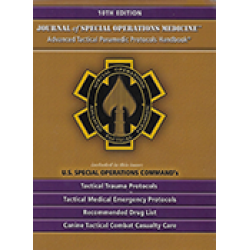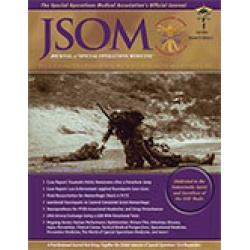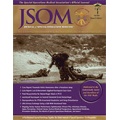Use of a Removable Mandibular Neuroprosthesis for the Reduction of Posttraumatic Stress Disorder (PTSD) and Mild Traumatic Brain Injury/PTSD-Associated Nightmares, Headaches, and Sleep Disturbances
Moeller DR, Duffey JM, Goolsby AM, Gallimore JT 14(3). 64 - 73 (Journal Article)
Introduction: Posttraumatic stress disorder (PTSD) has been associated with nighttime headaches (HAs), nightmares (NMs), and difficulty falling or staying asleep (sleep disturbances [SD]). The authors of the current study evaluated the correlative elements of using a removable mandibular neuroprosthesis (RMN) and the reduction of these symptoms in participants diagnosed with PTSD or mild traumatic brain injury (mTBI)/PTSD. The RMN device is a form of specialized dental splint that has a potential to reduce the painful stimuli of bruxing and potential upregulation of threat response systems that may occur during sleep. Method: A sample of 32 individuals was selected through random assignment from a volunteer base of 200 volunteers for examination by self-report according to an A-B-A-B design. The sample included 25 men and 7 women between the ages of 21 and 65; 21 had military experience and 11 were civilians. Participants were asked to rate the frequency and intensity of their HAs, NMs, and SD during each phase. Their responses were scored using a custom survey (equivalent forms reliability) that provides ratio-scaled results for symptom frequency and intensity. The original number of participants was 35 with three participants dropping out before the conclusion of the study. Results: Survey scores for PTSD-related sleep symptoms were relatively high at baseline (x̄ = 0.52) and significantly lower in the first experimental phase (x̄ = 0.20). Scores in the second experimental phase were likewise lower (x̄ = 0.38). Significant reductions in symptoms were reported across all three dimensions. Discussion: All participants reported some improvement in symptoms while using the device. No participants reported worsening of any symptoms as a result of using the RMN. Participants commonly reported that improvements in symptoms were immediate and did not diminish over time. Data indicate that there is a negative correlation between the use of an RMN and the reduction of HAs, NMs, and SD in persons diagnosed with PTSD or mTBI/PTSD.


 Español
Español 




